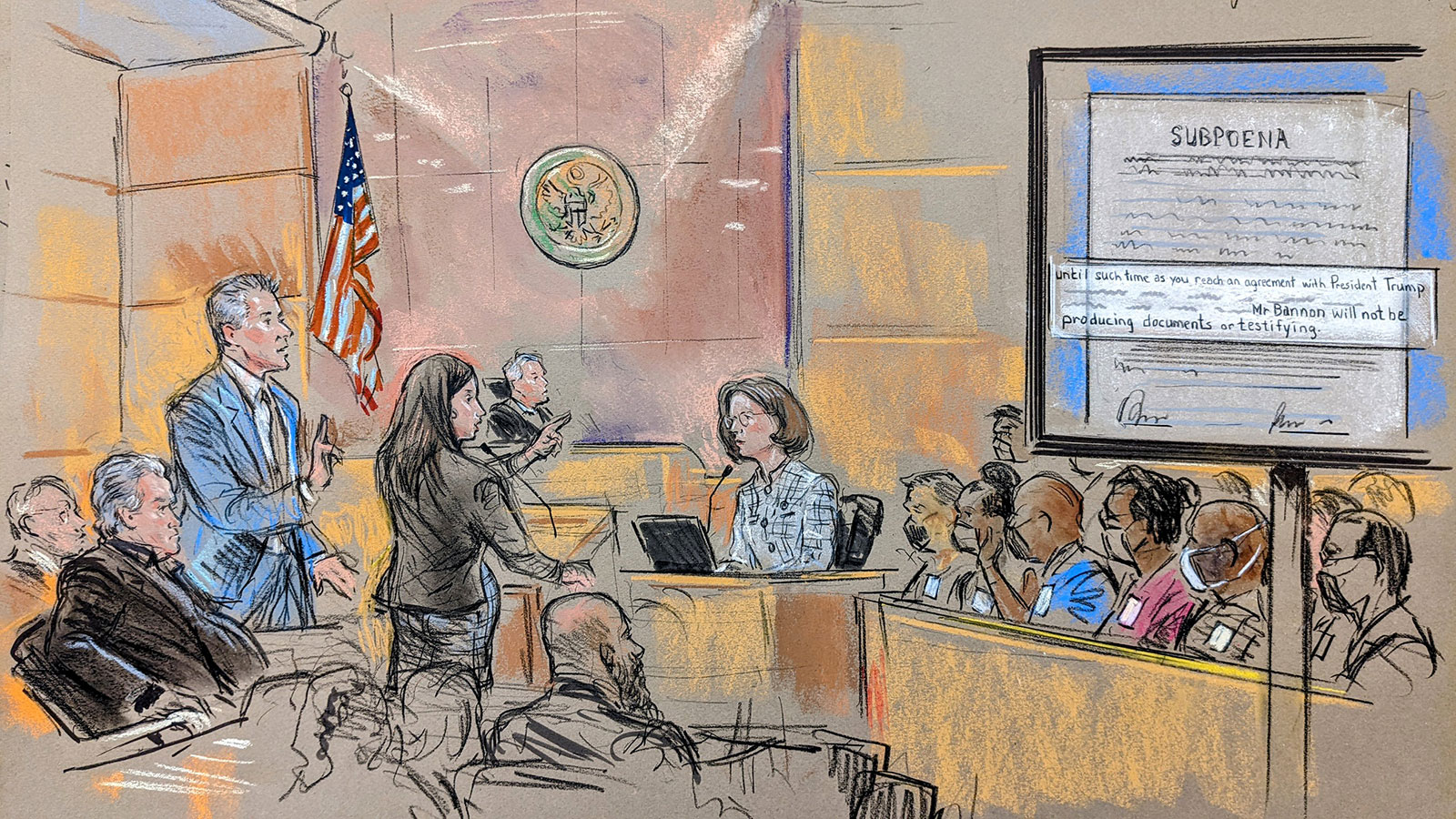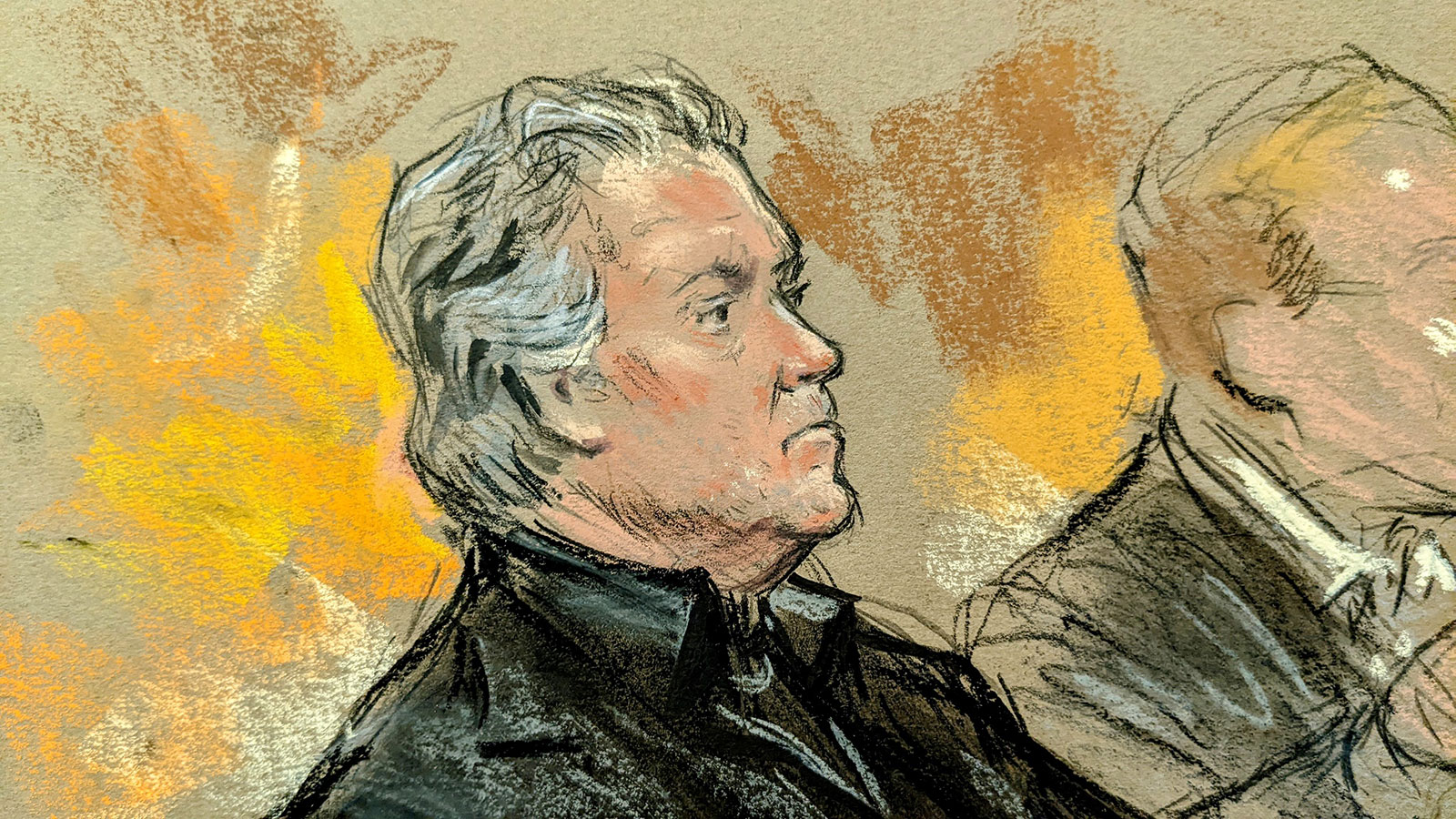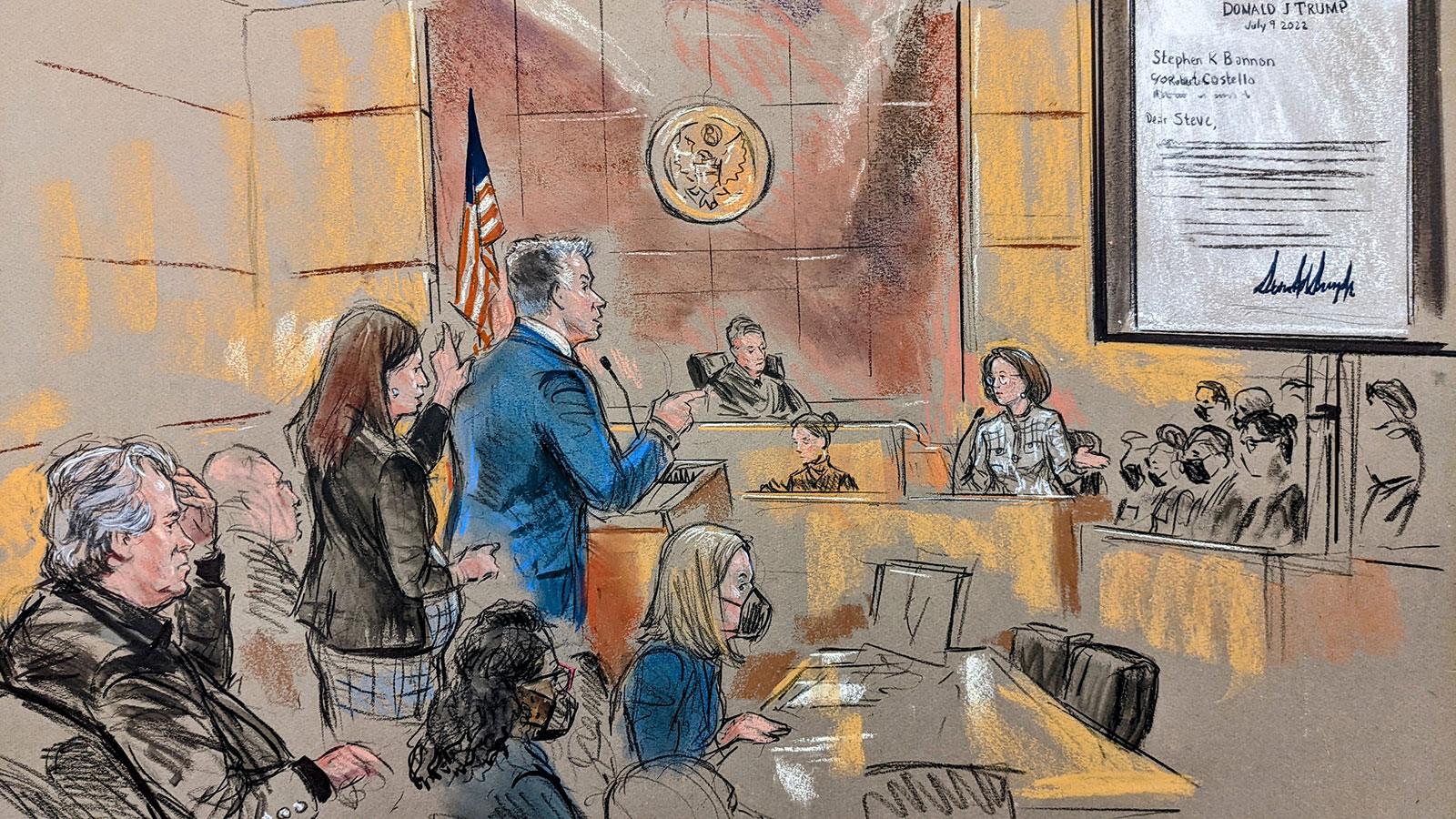
Steve Bannon trial resumes
Day 4 of Steve Bannon’s contempt of Congress trial is underway
From CNN’s Tierney Sneed and Katelyn Polantz
Thursday’s proceedings in the trial of Steve Bannon gaveled in at 10:37 a.m. ET.
Before the jury is brought in, the parties will present arguments to US District Judge Carl Nichols about certain legal issues in the case.
Key takeaways from the 2nd day of testimony in Steve Bannon’s contempt of Congress trial
From CNN’s Tierney Sneed and Katelyn Polantz

Prosecutors rested their case against Steve Bannon yesterday, having kept to an approach to keep things simple and straightforward for the jury.
To present their evidence that Bannon, the ex-adviser to former President Donald Trump, was in contempt of Congress for not complying with a subpoena in the House Jan. 6 investigation, the Justice Department put only two witnesses on the stand.
Through their questioning of House committee staffer Kristin Amerling, prosecutors walked the jury through the paper trail of documents communicating to Bannon that the October deadlines for him to produce documents and sit for testimony. Bannon’s team meanwhile grasped at what they could — including his recent offer to testify before the committee — to try to suggest that Bannon had reason to believe that the deadline wasn’t firm, while also hinting at supposed bias against him.
Here are four takeaways the third day of proceedings and the second day of testimony:
Paper trail boosts prosecutors’ case against Bannon
The pace of Wednesday’s testimony largely relied on the letters between the House select committee investigating the Jan. 6 insurrection and Bannon.
Several defenses that Bannon might try to put forward were undermined by the paper trail of documents the committee sent him regarding his subpoena and the prosecution was able to put those documents on display through its questioning of Amerling.
The documents showed that Bannon was warned that his noncompliance with the subpoena risked a criminal referral. They showed that the committee rejected his claims that Trump assertions of executive privilege precluded him from cooperating. And they showed that the committee reaffirmed the subpoena deadlines and lawmakers’ expectations that he comply by then.
Amerling was also questioned about the responses the committee received from Bannon’s attorney. She testified that Bannon never asked for the deadlines to be moved, nor did he give the committee reasons that in the committee’s view would help justify his lack of compliance, such as that he didn’t understand the directions of the subpoena.
Bannon’s team says committee gave him flexibility
After a series of rulings limiting his defenses, Bannon finally got a holding in his favor, with District Judge Carl Nichols on Wednesday giving his team the OK to admit his lawyer’s and Trump’s recent letters for the committee clearing him to testify. With the ruling, they also admitted a previously unreported letter committee Chairman Bennie Thompson sent last week responding to Bannon’s offer to testify for the committee.
The Bannon team has had very little to work with at this trial. So the ability to use the letters in their questioning of Amerling was a rare opportunity for them to expand Bannon’s defense — and allowed the topic of executive privilege to hang over the case more than the Justice Department had intended. Bannon’s team was seeking to use the correspondences to bolster the case that Bannon had reason to believe that the October return dates were not a hard deadline but rather flexible inflection points in the process of negotiating over Bannon’s cooperation.
In his question of Amerling, Corcoran pointed her specifically to Thompson’s indication that it would still host Bannon for testimony.
The Bannon team hopes that the jury sees that as evidence that, even when subpoenas have return dates, the process was an open-ended one and that Bannon had reason to believe that when he blew past the October deadlines, that his cooperation at later date would be an acceptable one to the committee. (The judge has instructed jurors that any future compliance by Bannon with the subpoena was not relevant to whether he was in default last year.)
Trial could conceivably sit with the jury Thursday
The Justice Department wrapped its case quickly on Wednesday with a short set of questions for its second witness, FBI agent Stephen Hart, who read public statements from Bannon that said he would stand with Donald Trump and links on his social media accounts to stories describing him as not complying with the committee, even after one subpoena deadline passed.
Now the question will be how many witnesses, if any, the defense team calls to help Bannon’s cause. If they call none — and Bannon doesn’t testify, the case could conceivably head to jury deliberations by the afternoon.
One defense strategy: Call out the Democrats
Wednesday’s proceedings kicked off with a discussion between the attorneys and judge about whether the case would be a political circus. Judge Carl Nichols said he would not let it become one.
Yet during defense attorney Evan Corcoran’s hours of questioning Amerling, he repeatedly probed her politics. The questions attempted to show the Washington, DC, jury she and the Democratic-leaning committee may have unfairly singled out Bannon among their thousands of witnesses.
Corcoran was able to ask Amerling, a two-decade Hill veteran, the parties of the lawmakers she worked for and about her political contributions. Her past attendance at a book club alongside a prosecutor on the case spun into a lively set of questions. But when Bannon’s attorneys shifted to questions about the larger political dynamics of the House and the committee’s actions, the judge largely blocked them from going there.
Read more takeaways here.
Why the Jan. 6 committee wanted to find out what Bannon knew
From CNN’s Tierney Sneed and Katelyn Polantz

Steve Bannon’s defense attorney Evan Corcoran pressed witness Kristin Amerling on Wednesday about why the House select committee investigating the Jan. 6, 2021, riots at the US Capitol chose to pursue information from Bannon so early in their investigation — in fall 2021.
Her answer has minimally illuminated the panel’s investigation.
“By the time we put the subpoena together, there was a general interest from obtaining information from him expeditiously,” she said. The committee believed that whatever Bannon shared could lead them to other witnesses or documents, or perhaps help them know what they shouldn’t pursue, Amerling testified.
The defense has made clear they’re trying to undercut the firmness of Bannon’s subpoena deadlines by showing the committee’s work in ongoing.
“The committee is operating under a very tight timeline,” because the House select committee’s authorization ends with the end of this Congress, Amerling added under oath.
Bannon was one of the first potential Jan. 6 witnesses the House committee subpoenaed. The committee said it wanted to obtain his documents and ask him questions because Bannon had contact with former President Donald Trump. Bannon was in the so-called war room of Trump allies at the Willard hotel in Washington, DC, as the riot unfolded, and made a prediction on his podcast before the riot that “all hell” was “going to break loose.”
Some context: The Jan. 6 committee is holding its eighth public hearing on Thursday night. It says it will focus on the three-plus hours when then-President Donald Trump did not step in to stop the insurrection. It says it will lay out the inaction from Trump as the violence unfolded, select committee aides tell CNN.
The hearing will feature testimony from individuals who spoke to Trump on Jan. 6, and individuals who were in the West Wing including live testimony from Matthew Pottinger, who served on Trump’s National Security Council, and Sarah Matthews, Trump’s former deputy press secretary, according to previous CNN reporting.
A House committee staffer took the stand yesterday. Here’s what she said.
From CNN’s Tierney Sneed and Katelyn Polantz

Kristin Amerling, deputy staff director of the House select committee, answered questions from both the prosecution and the defense as Steve Bannon’s trial continued on Wednesday.
Evan Corcoran, the attorney of Bannon, asked Amerling questions to demonstrate that the work of the House select committee investigating the Jan. 6 insurrection, which subpoenaed Bannon, is ongoing. Amerling testified that the committee is still receiving and reviewing documents.
Asked if the committee’s work will continue through the end of the year, Amerling testified that its investigation is authorized through that time.
In another series of key questions, Amerling confirmed that the Jan. 6 committee did not get the cooperation from Bannon that it sought.
“He did not” was the refrain Amerling used several times in her testimony, clearly testifying that Bannon did not comply with various requirements outlined in his congressional subpoena.
Did the defendant produce documents by Oct. 7, the deadline given on the subpoena?
“He did not.”
Did he ever ask for an extension?
“He did not.”
Did he ever say he didn’t have documents?
“He did not.”
Previously: During his opening statement on Tuesday, Corcoran said that there “was no ignoring the subpoena.” Corcoran went through the timeline around the subpoena, but not without a brief detour into a discussion of the role politics was playing.
Corcoran noted the communications between Amerling and Bannon’s lawyer Robert Costello. “The evidence is going to show there is direct engagement” between the committee staff member and Bannon’s attorney, Corcoran said.
“There was no ignoring the subpoena. There will be no evidence showing that,” he said.
What we know about the 14 jurors in Steven Bannon’s trial
From CNN’s Katelyn Polantz and Tierney Sneed
Steve Bannon’s trial on contempt of Congress charges finalized its jury on Tuesday.
Fourteen jurors — 9 men and 5 women — were sworn in at the federal district courthouse in Washington, DC.
The jury includes a State Department employee, an art salesperson, a NASA contractor, a doctor, an architect and a handful of DC government employees.
Some of the jurors have extensive previous experience serving on juries, according to their statements in court yesterday. The jury has 14 people because two alternates are in the pool, and won’t be disclosed publicly until deliberations.
Some context: During the first portion of Monday’s jury selection process, potential jurors were not pressed about their general feelings about Bannon or former President Trump.
They were, however, asked about their news consumption of the House investigation of the Jan. 6 insurrection and about this case itself. Some said they’d consumed a little of the House hearings, if that.
Many of the potential jurors had said they’d heard minimally about Bannon’s case, yet a large number of them had taken in at least some of the select committee’s public hearings. But awareness alone wasn’t enough for them to be tossed from the jury pool.
Steve Bannon’s trial enters its 3rd day of testimony today. Here’s what you need to know.
From CNN’s Katelyn Polantz and Tierney Sneed
Steve Bannon is on trial on two criminal charges for his failure to comply with the House’s Jan. 6, 2021, investigation 10 months after receiving subpoenas from the select committee.
The polarizing long-time Trump ally has always been at the top of the Jan. 6 witness list for House investigators. But Justice Department prosecutors say the trial is intended to punish Bannon for noncompliance with the subpoenas, rather than coerce him into sharing information.
Here are key things to know about the case:
Why the case matters: The case is a major test of what leverage Congress has when a witness evades a House subpoena. Bannon’s is the first of two similar House select committee subpoena cases to head to trial; a contempt case against former White House trade adviser Peter Navarro is still in its early stages.
Bannon’s trial also carries special relevance for the House panel as it continues to negotiate to bring in additional witnesses, and as it prepares for a major primetime hearing Thursday night intended to spotlight what committee members have called former President Donald Trump’s “dereliction of duty” on January 6.
How the trial could unfold: Prosecutors pledge that their case against Bannon will be presented succinctly, over just a few days, with only two or three prosecution witnesses. That list includes House committee investigators.
It’s unknown how extensive Bannon’s defense will be, or if he will want to take the stand in his own defense. He will not be able to force House members to testify, the judge has said.
Bannon’s attempts to stop the trial: Bannon — who accepted an 11th-hour pardon from Trump in 2021 as he was facing conspiracy wire fraud and money laundering charges in Manhattan’s federal court related to a border wall fundraising scheme — has made a series of attempts in court in recent days to stop the trial, to fashion more of a defense, or to prepare for possible appeals.
So far, US District Judge Carl Nichols has overwhelmingly sided with the Justice Department on what evidence the jury can hear, cutting off Bannon’s ability to try to defer to advice his attorney gave him or to use internal DOJ policies on presidential advisers that he hoped might protect him.
In recent weeks, Trump indicated he wanted to waive any executive privilege that might have applied to Bannon, and Bannon suggested he may be interested in speaking with the House committee — a series of events that Bannon’s team now wants to try to show to the jury. But his ability to bring up arguments about executive privilege will be, at best, severely limited. Bannon was not a government official during the period the committee is probing.
The charges: A federal grand jury indicted the right-wing figure in November on two counts of criminal contempt — one for his failure to provide testimony demanded by the House select committee’s subpoena in the fall and the other for his failure to produce documents. A key issue at trial will be whether the jury agrees with prosecutors and the House that Bannon’s October subpoena deadlines were final, and that he deliberately disregarded them.
Both charges he faces are misdemeanors. But if he is found guilty, each carries a mandatory minimum of 30 days in jail.
Keep reading about the case here.
Source: https://www.cnn.com/politics/live-news/steve-bannon-trial-contempt-congress-07-21-22/h_f9ef7d52910a0a4576c2ca1f4cdc9101















